Taco Del Mar offers fresh, Baja-inspired Mexican cuisine with customizable options. This guide provides detailed nutrition information to help you make informed, healthy choices while enjoying their flavorful meals.

Overview of Taco Del Mar’s Menu and Nutrition Focus
Taco Del Mar’s menu features a variety of fresh, Baja-inspired dishes, including burritos, tacos, bowls, and more. The restaurant emphasizes using high-quality ingredients and customizable options to cater to diverse dietary preferences. With a focus on nutrition, Taco Del Mar provides balanced meals that combine flavor with healthy choices, making it a popular choice for those seeking convenient yet nutritious fast food options.
Importance of Understanding Nutrition in Fast Food
Understanding nutrition in fast food is crucial for making informed choices that align with health goals. While fast food is often convenient, it can be high in calories, sodium, and unhealthy fats. Knowing the nutritional content helps consumers avoid excessive intake and opt for balanced meals. Taco Del Mar’s nutrition guide empowers customers to make healthier decisions, ensuring they enjoy flavorful meals without compromising on dietary needs or preferences.

Nutritional Overview of Taco Del Mar’s Popular Items
Taco Del Mar’s popular items offer a variety of flavors with customizable options. They provide a balance of calories, macronutrients, and fiber, catering to diverse dietary preferences while maintaining freshness and flavor.
Calorie and Macronutrient Breakdown
Taco Del Mar’s menu items vary in calorie and macronutrient content, with options ranging from 200 to over 1,000 calories per serving. Protein sources include lean meats, beans, and dairy, while carbohydrates come from tortillas, rice, and beans. Fats are primarily from guacamole, sour cream, and cheeses. Customization allows for adjusting macronutrient ratios, making meals suitable for various dietary needs. Balanced options ensure flavor and nutrition without excessive calorie intake.
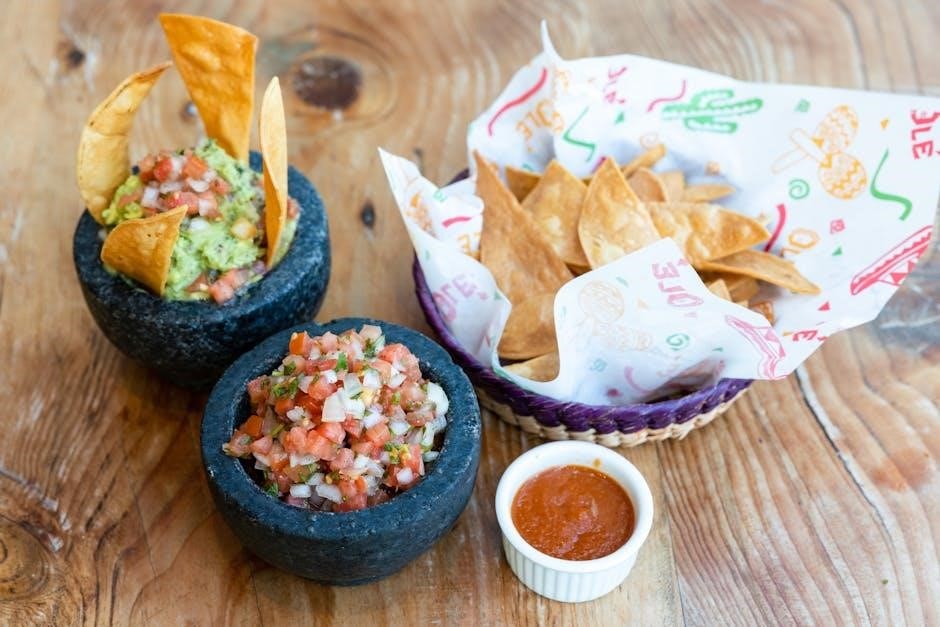
Fat, Carbohydrates, and Protein Content
Taco Del Mar’s menu items balance fats, carbohydrates, and proteins. Fats come from guacamole, sour cream, and cheeses, while carbs are primarily from tortillas, rice, and beans. Proteins include lean meats, beans, and dairy. Burritos and tacos tend to have higher carbs and fats, while bowls and salads offer lower-carb, protein-rich options. Customization allows guests to adjust macronutrient levels, ensuring meals align with dietary preferences and goals. This balance makes Taco Del Mar a versatile choice for various nutritional needs.
Fiber and Vitamin Content in Menu Items
Taco Del Mar’s menu items are rich in fiber and essential vitamins. Whole grains, beans, and vegetables provide dietary fiber, supporting digestion and satiety. Fresh toppings like tomatoes, lettuce, and cabbage contribute Vitamin C and A, boosting immunity and vision health. Guacamole adds Vitamin E, while citrus-based sauces enhance Vitamin C intake; These nutrients make Taco Del Mar’s offerings a nutritious and balanced choice for health-conscious diners seeking flavorful, vitamin-rich meals.
Healthy Eating Options at Taco Del Mar
Taco Del Mar offers a variety of healthy eating options, including vegetarian and vegan choices, lean proteins, and fresh vegetables. Customize your meal for balanced nutrition.
Low-Calorie and Low-Fat Alternatives
Taco Del Mar offers several low-calorie and low-fat options to suit health-conscious diners. Opt for burritos without the tortilla, choosing a bowl instead, or select tacos with corn tortillas for fewer calories. Grilled chicken or steak bowls with brown rice, beans, and vegetables provide lean protein and fiber. Customize by adding low-fat toppings like salsa, lettuce, and tomatoes. Avoid high-calorie extras like guacamole and sour cream to keep your meal nutritious and flavorful without excess fat.
Vegetarian and Vegan Options
Taco Del Mar provides a variety of vegetarian and vegan-friendly options, making it easy to enjoy a plant-based meal. The vegetarian burrito bowl, loaded with beans, rice, and fresh vegetables, is a hearty choice. Vegans can opt for tacos with corn tortillas, filled with beans, salsa, and lettuce. Guacamole adds a creamy touch without dairy. Customize by holding cheese and sour cream, ensuring your meal aligns with your dietary preferences while maintaining bold, authentic flavors.
Gluten-Free and Other Special Dietary Options
Taco Del Mar offers gluten-free options, including corn tortillas for tacos and burritos. Guests with dietary restrictions can opt for bowls without rice or beans for low-carb or keto-friendly meals. Many menu items are naturally free from gluten, and staff can guide modifications. For other special diets, such as dairy-free or soy-free, customers can customize toppings and sauces. This flexibility ensures everyone can enjoy a meal tailored to their needs while savoring the fresh, Baja-inspired flavors.
Nutrition Information for Specific Menu Items
Taco Del Mar provides detailed nutrition facts for burritos, tacos, bowls, and salads, including calories, fats, carbs, and proteins, helping you make informed choices.
Burritos and Tacos: Nutritional Comparison
Taco Del Mar’s burritos and tacos vary in nutritional content. Burritos typically have more calories and carbs due to the tortilla and added rice and beans. Tacos, especially with corn tortillas, are lower in carbs and can be a healthier option. Both can be customized to reduce fat and sodium by choosing lean proteins and skipping extras like cheese and sauces. Opting for vegetarian options further reduces calories and fat content.
Bowls and Salads: Healthier Choices
Taco Del Mar’s bowls and salads are excellent options for those seeking lighter, nutrient-dense meals. Packed with fresh vegetables, lean proteins, and fiber-rich ingredients, these dishes offer a balanced mix of nutrients. Customization allows for healthier choices, such as adding guacamole for healthy fats or opting for salsa instead of high-calorie dressings. These options are particularly beneficial for individuals looking to reduce calorie and fat intake while still enjoying flavorful, satisfying meals.
Quesadillas and Other Specialty Items
Taco Del Mar’s quesadillas and specialty items offer a blend of flavor and nutrition. Quesadillas are typically high in calories and fat due to cheese and tortillas, but opting for chicken or steak adds lean protein. Specialty items like grilled shrimp or veggie options provide varied nutritional profiles. Customizing with lighter toppings can enhance their health benefits, making them a versatile choice for diners seeking a mix of taste and nutrition in their meal.
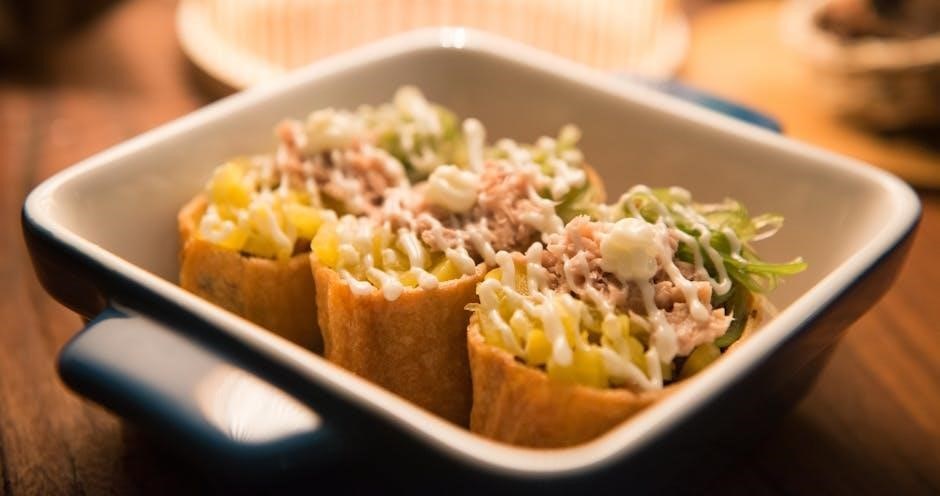
Low-Carb and Keto-Friendly Options
Taco Del Mar offers keto-friendly options by swapping tortillas for lettuce wraps or bowls. Focus on protein-rich items like grilled chicken or steak, paired with fresh veggies, to align with keto diet principles while enjoying bold flavors.
Modifying Menu Items for Keto Diets
To tailor Taco Del Mar items for a keto diet, swap high-carb tortillas with lettuce wraps or bowls. Opt for protein-rich options like grilled chicken or steak, and load up on veggies. Hold the beans and rice to reduce carbs further. Customize by adding keto-friendly toppings such as avocado, sour cream, and shredded cheese. These modifications help align your meal with keto principles, focusing on high fat and moderate protein while keeping carbs low. This approach ensures flavorful and satisfying keto-friendly meals at Taco Del Mar.
Low-Carb Alternatives to Traditional Tacos
For a low-carb twist, opt for Taco Del Mar’s lettuce wraps or bowls instead of traditional taco shells. Choose protein-packed options like grilled chicken or steak, paired with fresh veggies. Skip the beans and rice to minimize carbs. Enhance flavor with avocado, sour cream, or shredded cheese. These alternatives offer a keto-friendly, low-carb take on tacos while maintaining bold flavors and satisfying your cravings without the extra carbs found in standard tortillas.
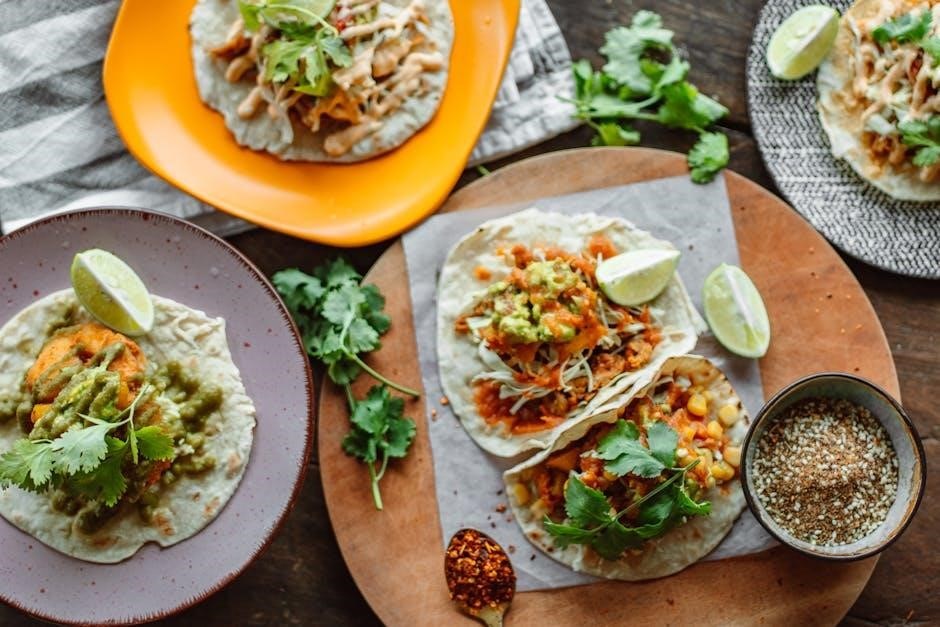
Sodium Content in Taco Del Mar Meals
Taco Del Mar meals may contain high sodium due to seasonings, sauces, and cheeses. Opt for lower-sodium options like fresh veggies and lean proteins to reduce intake.
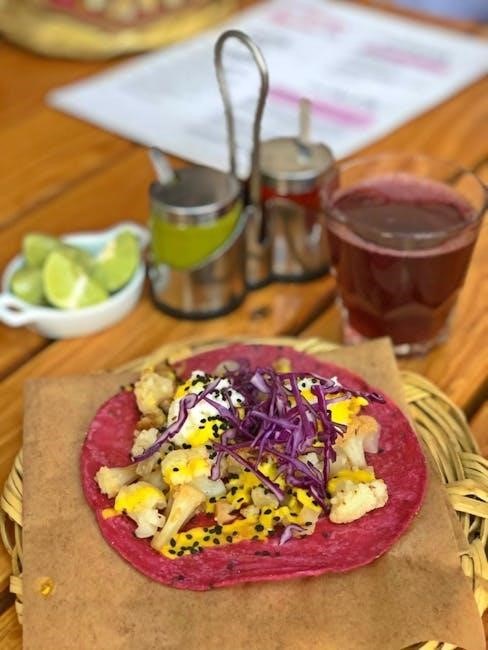
Understanding Sodium Levels in Menu Items
Taco Del Mar’s menu items vary in sodium content, with burritos and tacos often containing higher levels due to seasonings and sauces. A standard burrito may range from 1,200 to 1,800mg of sodium, while tacos can reach up to 1,000mg per serving. Adding toppings like guacamole or salsa increases sodium further. However, the restaurant’s focus on fresh ingredients helps balance the overall nutritional profile, making it easier to manage sodium intake with mindful choices.
Reducing Sodium Intake in Your Meal
To reduce sodium at Taco Del Mar, opt for simpler menu items like salads or bowls without added sauces. Request no seasoning on proteins or skip high-sodium toppings like salsa and cheese. Choosing corn tortillas instead of flour can also lower sodium. Limiting add-ons and customizing your meal allows for healthier options while still enjoying the fresh, flavorful ingredients Taco Del Mar offers.
Comparing Taco Del Mar to Competitors
Taco Del Mar stands out for its fresh ingredients and customizable options, offering a healthier fast-food alternative compared to competitors like Taco Bell, with lower sodium and calorie counts.
Nutritional Differences from Other Fast Food Chains
Taco Del Mar distinguishes itself with a focus on fresh, Baja-inspired ingredients, offering lower sodium and calorie counts compared to competitors like Taco Bell. Their menu emphasizes whole foods, such as lean proteins, whole grains, and abundant vegetables, providing a more balanced nutritional profile. This approach aligns with health-conscious dining, making Taco Del Mar a preferable choice for those seeking nutritious fast food options without compromising on flavor or quality.
Healthier Alternatives to Traditional Fast Food
Taco Del Mar provides healthier alternatives by offering customizable, Baja-inspired dishes with fresh ingredients like lean proteins, whole grains, and vegetables. Unlike traditional fast food, their menu emphasizes nutrient-dense options such as bowls, salads, and low-calorie burritos. This approach allows customers to enjoy flavorful meals while maintaining dietary balance, making Taco Del Mar a standout choice for health-conscious individuals seeking better fast food alternatives without sacrificing taste or convenience.
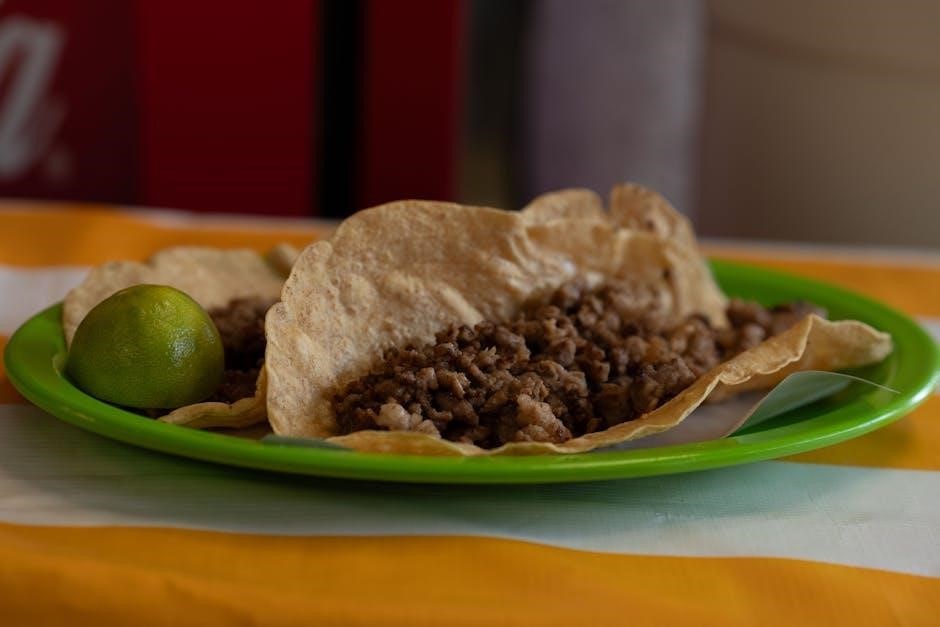
Customizing Your Meal for Better Nutrition
Customize your Taco Del Mar meal by choosing whole-grain tortillas, lean proteins, and plenty of vegetables. Opt for low-calorie toppings like salsa and guacamole to enhance flavor and nutrition without adding unhealthy fats.
Toppings and Sides to Enhance Nutritional Value
Enhance your meal with nutrient-rich toppings like fresh salsa, avocado, and shredded lettuce for added fiber and vitamins. Opt for sides such as black beans or brown rice to boost protein and fiber content. Choose low-calorie options like diced tomatoes or grilled vegetables to increase nutritional value without excess calories. These additions can make your meal more balanced and satisfying while staying aligned with your dietary goals.

Avoiding Unhealthy Add-Ons
Minimize unhealthy add-ons like sour cream, cheese, and fried tortilla strips to reduce calorie and fat intake. Opting for lighter alternatives such as guacamole or salsa can maintain flavor while keeping your meal healthier. Avoiding high-sodium sauces and limiting processed toppings helps lower overall sodium content. By making mindful choices, you can enjoy a more balanced and nutritious meal without unnecessary unhealthy additions.
Nutrition Table and Key Takeaways
This section summarizes the nutritional data, highlighting calorie, macronutrient, and sodium content. It provides actionable tips for making healthier choices and customizing meals effectively.
Taco Del Mar’s menu offers a range of nutritional options, with meals generally ranging from 300 to 1,000 calories. Items are balanced with carbs, protein, and fats, though sodium levels can be high. Many dishes are rich in fiber and vitamins, especially those with vegetables. Vegetarian and low-carb options are available, catering to diverse dietary needs. This guide helps you navigate the menu to make choices that align with your health goals and preferences while enjoying flavorful Baja-inspired cuisine;
Final Tips for Making Informed Choices
Review Taco Del Mar’s nutrition guide to understand calorie, protein, and sodium content. Opt for whole grains and vegetables to boost fiber and vitamins. Choose wisely with toppings, as extras like guacamole and sour cream add calories. Moderate portion sizes and avoid high-sodium options if necessary. Customize meals to suit your dietary goals, such as low-carb or vegetarian preferences, ensuring a balanced and satisfying dining experience.
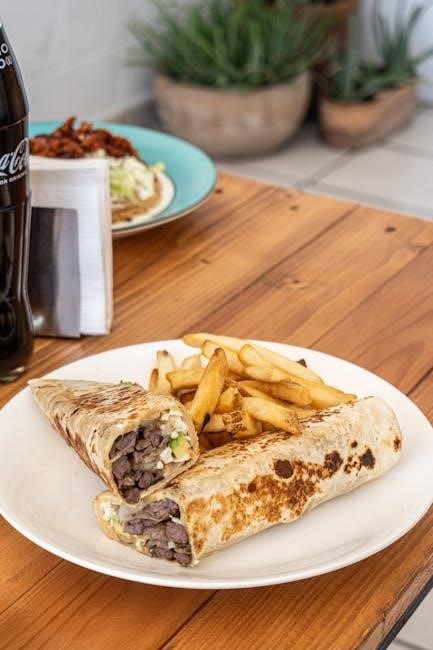
No Responses